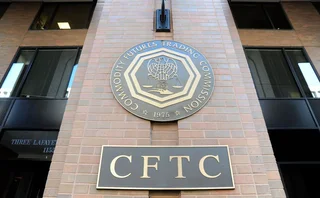
Geithner calls for law change to force OTC derivatives clearing
The US Treasury called upon Congress yesterday to amend the Commodities Exchange Act (CEA) to compel the "clearing of all standardised over-the-counter derivatives through regulated central counterparties".
In a letter to Senate majority leader Harry Reid, Treasury secretary Timothy Geithner wrote that financial regulators will need to take steps to ensure that central counterparties (CCPs) impose robust margin requirements and other necessary risk controls "to ensure that customised OTC derivatives are not used solely as a means to avoid using a CCP. If an OTC derivative is accepted for clearing by one or more fully regulated CCPs, it should create a presumption that it is a standardised contract and thus required to be cleared," he said.
Geither called for further changes to the CEA and other securities law, including authorising the Commodities Futures Trading Commission (CFTC) and the Securities and Exchange Commission (SEC) to impose more conservative margin requirements as well as record-keeping and reporting requirements, including an audit trail, on all derivatives trades.
Regulators would, however, consider these requirements satisfied if standardised trades are cleared through approved CCPs and bespoke transactions are reported to a regulated trade repository, such as the Depository Trust & Clearing Corporation's trade-information warehouse.
For their part, central counterparties and trade repositories would be obliged to "make aggregate data on open positions and trading volumes available to the public and to make data on any individual counterparty's trades and positions available on a confidential basis to the CFTC, SEC and the institution's primary regulators".
Institutions acting as large counterparties to derivatives trades will also be subject to conservative capital requirements, business conduct standards and reporting requirements. Legislative amendments will seek to empower the CFTC and SEC with "clear and unimpeded authority for market regulators to police fraud, market manipulation and other market abuses".
The Treasury also plans to further restrict unsophisticated investors from accessing derivatives markets, in the wake of a raft of scandals across the US where small municipalities have racked up billions of dollars in losses on derivatives contracts they claim were mis-sold - the most infamous being the $3.9 billion debt incurred by Jefferson County, Alabama on interest rate swaps written against bonds financing sewer reconstruction.
Geithner's language concerning what constitutes a "standardised" contract remained unclear in the letter. In one such example, he wrote that "price transparency should be improved in derivatives markets by requiring the clearing of standardised contracts through regulated CCPs and by moving the standardised part of these markets onto regulated exchanges".
Initiatives to standardise credit derivatives trading have accelerated in the months since the collapse of Lehman Brothers in September 2008, with the establishment of two CCPs in the US and a further two in Europe, and the hardwiring of CDS contracts and the conversion to standardised coupons on North American contracts under the International Swaps and Derivatives Association's 'big bang' protocol.
See also: Bair: US should pull back from Basel II
Fed divulges process behind bank stress tests
Geithner: US will "force all standardised OTC derivatives into central clearing"
Jefferson County head indicted on bribery, money laundering charges
The sewers of Jefferson County
Only users who have a paid subscription or are part of a corporate subscription are able to print or copy content.
To access these options, along with all other subscription benefits, please contact info@risk.net or view our subscription options here: http://subscriptions.risk.net/subscribe
You are currently unable to print this content. Please contact info@risk.net to find out more.
You are currently unable to copy this content. Please contact info@risk.net to find out more.
Copyright Infopro Digital Limited. All rights reserved.
As outlined in our terms and conditions, https://www.infopro-digital.com/terms-and-conditions/subscriptions/ (point 2.4), printing is limited to a single copy.
If you would like to purchase additional rights please email info@risk.net
Copyright Infopro Digital Limited. All rights reserved.
You may share this content using our article tools. As outlined in our terms and conditions, https://www.infopro-digital.com/terms-and-conditions/subscriptions/ (clause 2.4), an Authorised User may only make one copy of the materials for their own personal use. You must also comply with the restrictions in clause 2.5.
If you would like to purchase additional rights please email info@risk.net
More on Regulation
US Basel equivalence questioned as EU patience wears thin
MEPs say unfaithful US implementation of Basel III could trigger review of access to EU markets
The Term €STR transition: challenges and market readiness
The progress, challenges and factors shaping the adoption of Term €STR as financial institutions transition from Euribor
CFTC takes red pen to swaps rules, but don’t call it a rollback
Lawyers and ex-regs say agency is fine-tuning and clarifying regulations, not eliminating them
EU edges closer to calming FRTB fund-linked fray
Dealers say temporary solution is a step in the right direction but won’t fully resolve all issues
European Commission changes tune on proposed FRTB multiplier
Banks fear departure from original diversification factor undermines case for permanent relief
Supervisors should be mindful of geopolitical risks, says IMF
Shock events cause sizeable swings in asset pricing, institution’s latest report highlights
Bowman won’t commit to stress-testing the tariff shock
Nominated Fed vice-chair stonewalls calls to run ad hoc scenario similar to 2020 Covid test
Fed’s Bowman to ‘prioritise’ SLR exemption for US Treasuries
Reinstating Covid-era relief is a ‘no brainer’, dealers say, as bond markets reel from tariff chaos







